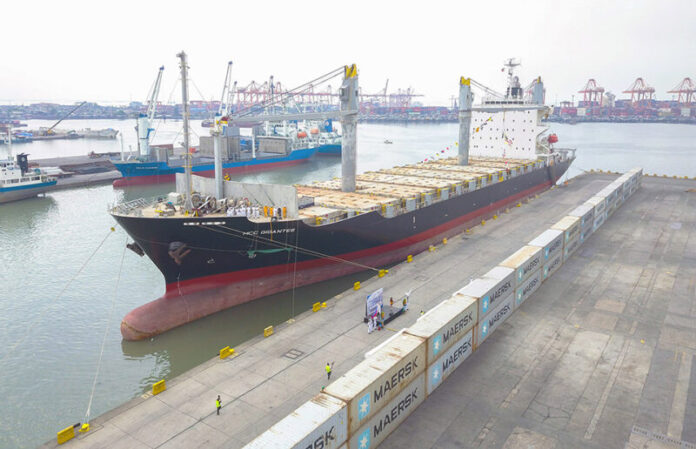
-
MCC Transport Philippines launched its third vessel, MV MCC Gigantes, the biggest containerized vessel in the Philippine domestic trade so far
-
MCC Gigantes, christened on March 20 at the Manila North Harbor, has a nominal capacity of 1,544 twenty-foot equivalent units with a length overall of 172 meters and 17,210 gross tonnage
-
MCCP president Darwin Emerson Lee said they acquired a third vessel “to expand our footprint in the Philippines and grow with the market”
MCC Transport Philippines Inc. (MCCP) recently launched its third vessel, MV MCC Gigantes, the biggest containerized vessel in the Philippine domestic trade so far.
MCC Gigantes, christened on March 20 at the Manila North Harbor, is named after the Gigantes Islands in Western Visayas, the region where MCCP’s two new ports of call—Bacolod and Iloilo—are located, MCCP president Darwin Emerson Lee said in a speech during the launch.
The name also represents the “giant” that the new vessel is.
MCC Gigantes—built in the Imabari Shipyard in Japan in 2010—has a nominal capacity of 1,544 twenty-foot equivalent units (TEU) with a length overall of 172 meters and 17,210 gross tonnage.
MCC Gigantes is bigger than MCCP’s two other vessels—MCC Palawan and MCC Batanes—each of which has a capacity of 1,100 TEUs.
The new vessel has the ability to carry its load at 18 knots, bringing both efficiencies in the domestic market while maintaining a reliable schedule through the network. It has three cranes capable of handling 40 tons each.
MCC Gigantes will be deployed on MCCP’s existing butterfly loop and paired with MCC Palawan. Port rotation is Manila-Cebu-Cagayan De Oro-Manila-General Santos-Davao-Manila.
MCC Gigantes’ maiden call was on March 21. She was enroute to General Santos and Davao.
The new vessel is expected to cater to all kinds of goods with MCCP having the equipment pool to handle various types of shipments.
MCC Batanes will handle the new weekly Visayas Service, with port rotating Manila-Cebu-Bacolod-Iloilo-Manila on a fixed weekly basis.
In an interview with PortCalls at the sidelines of the vessel launch, Lee said they decided to acquire a third vessel so they can “expand our footprint in the Philippines and grow with the market.”
Lee noted “the market is continuously growing in line with GDP” and that for the past two years, MCCP’s two vessels were “mostly full all throughout the year.”
He added: “Fulfilling the increasing demands of our customers has motivated us to do better and expand our services. MCCP has been in the Philippine domestic market for almost 17 years, the expansion aside from being timely shows our long term ambitions and commitment to the growing needs of our customers in the country.”
Despite her larger size, MCC Gigantes is able to enter shallow ports with her specialized hull design, while her satellite network connectivity and powerplant capacity ensure safe and monitored transport of up to 192 live reefer containers, fully monitored by both the crew onboard and an automated shore system.
Like MCC Batanes and MCC Palawan, MCC Gigantes uses Low Sulfur Fuel Oil (LSFO), which is compliant with the International Maritime Organization (IMO) International Convention for the Prevention of Pollution from Ships (MARPOL Convention) Annex VI. This policy requires all ships in non-emission control area zones to limit the sulfur content of their fuels from 3.50% to 0.50%.
Lee noted that while IMO 2020 has not been fully implemented in the domestic shipping industry, their vessels proactively converted to LSFO since 2020 when the policy took effect internationally, showing their dedication to sustainability.
MCCP is a joint venture between Sealand Maersk Asia Pte. Ltd., Mercantile Ocean Maritime Co (Fil) Inc. and 2GO Group Inc. – Roumina Pablo




